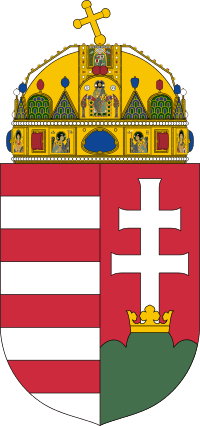Christian National Union Party
 |
| This article is part of a series on the politics and government of Hungary |
|
Executive
|
| Foreign relations |
|
Politics portal |
The Christian National Union Party (Hungarian: Keresztény Nemzeti Egyesülés Pártja, KNEP) was a political party in Hungary during the early 1920s.
History
The KNEP was established by Károly Wolff in October 1919 as the Christian National League, and was based on the pre-war Christian Party.[1] It was renamed the Christian National Union Party shortly afterwards. In the January 1920 parliamentary elections it won 82 seats, finishing second behind the National Smallholders and Agricultural Labourers Party. The two parties formed a coalition government on 15 March.[2]
Due to the presence of a number of strong personalties, including Sándor Ernszt, István Friedrich, Károly Huszár and Pál Teleki, the party quickly began to fragment, and by the spring of 1921 it had lost much of its strength.[1] It continued under Wolff's leadership, and became known as the Wolff Party.[1] The 1922 elections saw the party reduced to just 10 seats. It did not contest any further elections,[3] and around 1930 it merged with the Christian National Economic Party to form the Christian Economic and Social Party.[1]
Ideology
The party aimed to promote the interest of Catholics, and had a reactionary, anti-semitic programme. It was pro-Habsburg and pro-German.[1]
Further reading
- Fazekas, Csaba (2004). Collaborating with Horthy: Political Catholicism and Christian Political Organizations in Hungary. Political Catholicism in Europe 1918-1945 1 (Routledge). pp. 160–177.